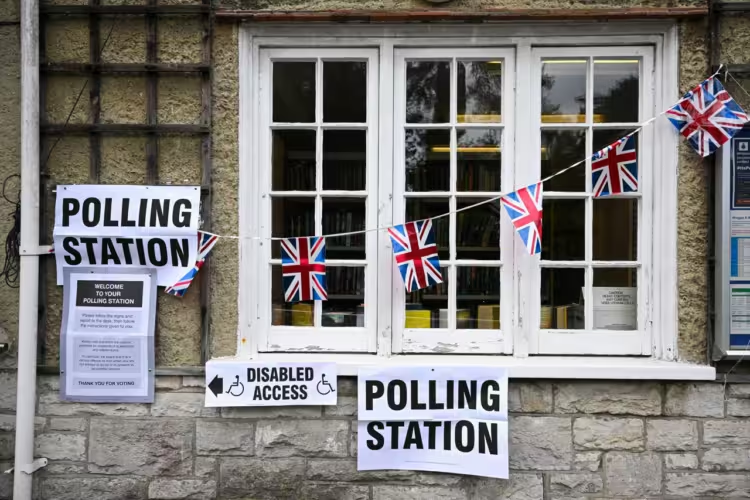By Ben Kerrigan-
The UK political landscape is on the verge of a seismic shift as the nation gears up for the general election on 4 July 2024. After 14 years under Conservative rule, the Labour Party, led by Sir Keir Starmer, is poised to secure a historic victory, potentially achieving the largest majority for the party in over two decades.
This forecast is based on a series of polls and in-depth analyses, including research from More in Common, The News Agents podcast, and The Guardian, all of which suggest a significant lead for Labour.
Also poster MRP forecast, based on data from more than 58,000 people, suggests Sir Keir Starmer’s party will win a huge majority of 194, with some 422 seats, while the Conservatives could suffer their biggest loss since 1906, winning just 140 seats.
Sunak, who was put in power by his party, called this year’s election, gambling away his power and authority in the wake of defeat in the last local elections.
The conservative party have controlled power for the past two decades, winning successive elections with relative ease for one reason or the other.
Projects suggest that trend is about to end in the elections ahead, though election polls have always been susceptible to serious errors.
. The Guardian’s tracking data, which aggregates results from major British polling companies, shows Labour holding 44.7% of the vote compared to the Conservatives’ 23.8%. This substantial lead is further corroborated by an analysis conducted by More in Common and The News Agents podcast.
This analysis, using multi-level regression and post-stratification (MRP), models the likely outcome of the election across all constituencies in Great Britain, providing a detailed projection of voter intentions.
The More in Common analysis suggests Labour could win a total of 382 seats, giving them a comfortable majority of 114 seats in the House of Commons. I
n stark contrast, the Conservatives are projected to win only 180 seats, potentially their lowest count since the 2001 election. Such a dramatic shift would mark a significant realignment in British politics, effectively ending the Conservative dominance that has shaped UK policy for over a decade.
The leadership dynamics between Keir Starmer and Rishi Sunak are crucial to understanding the current political climate. Public perception of these leaders has a significant impact on voter intentions and ultimately the election outcome.
Keir Starmer, a former Director of Public Prosecutions, has leveraged his legal background to present himself as a disciplined, pragmatic, and detail-oriented leader. Starmer’s approach has been to rebuild Labour’s credibility after the tumultuous tenure of Jeremy Corbyn, whose leadership saw the party move significantly to the left, resulting in a crushing defeat in the 2019 general election.
Starmer’s focus has been on restoring trust in Labour. He has distanced the party from the more controversial aspects of Corbynism, emphasizing a return to centrist policies that appeal to a broader electorate.
His calm and methodical demeanor contrasts sharply with the more flamboyant and often polarizing style of his predecessors. This has helped him project an image of stability and reliability, resonating with voters looking for a steady hand to navigate the current economic and social challenges.
Rishi Sunak, on the other hand, has faced significant challenges since taking office. Initially hailed for his management of the economy during the COVID-19 pandemic, Sunak’s popularity has waned amidst ongoing economic difficulties, including rising inflation and a cost-of-living crisis.
Despite his efforts to position himself as a competent and decisive leader, Sunak has struggled to unify his party and address the public’s growing concerns.
One of the key criticisms of Sunak’s leadership has been his perceived indecisiveness and lack of clear direction. This has been compounded by internal divisions within the Conservative Party, making it difficult for him to implement cohesive policies.
The public perception of Sunak as a leader who is out of touch with ordinary voters has also been a significant impediment to his ability to garner widespread support.
Economic issues are at the forefront of voter concerns in the upcoming election. The UK is grappling with rising inflation, a cost-of-living crisis, and economic uncertainty stemming from both domestic and international factors. These economic challenges have created a fertile ground for Labour to criticize the Conservative government’s handling of the economy.
Labour has positioned itself as the party that can provide economic stability and growth. Starmer and his team have outlined plans to invest in public services, particularly the NHS, and to implement policies aimed at reducing economic inequality. These proposals have struck a chord with voters who feel that the Conservative government has failed to manage the economy effectively.
The state of public services, particularly the NHS, is another critical issue influencing voter intentions. The NHS has been under significant strain, with long waiting times, staff shortages, and funding challenges. Labour has promised to address these issues through increased investment and comprehensive reform.
Starmer’s focus on public services extends beyond the NHS. Labour has also highlighted the need for improvements in education, social care, and housing.
These issues are particularly resonant with voters who have experienced the impact of austerity measures and are seeking a government that prioritizes public welfare.




